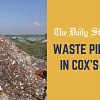‘Polluter pays’ doctrine will take on new meaning

Companies will learn the hard way that polluting the world has a cost. Ten years after the deadly Rana Plaza factory-building collapse that killed more than 1,000 underpaid textile workers in Bangladesh, cheap polyester clothes from Shein, Boohoo or Primark continue to fill our wardrobes before hitting the landfill. Meanwhile, more than 350 million metric tons of Coca-Cola bottles, Mars wrappers and other plastic items are discarded each year. This may change as a crackdown on fossil fuel-based waste takes shape in 2024.
Plastic, a range of wonderfully versatile and resistant materials derived from petroleum, has become ubiquitous in sectors ranging from food products to fashion. Its success is linked to the fact that it's seemingly cheaper than more sustainable alternatives. For example, containers in biodegradable plastics, like those produced by CJ Biomaterials, owned by Korean food and biotech company CJ CheilJedang can be three to five times more expensive than those made of fossil fuel-based virgin plastics. Polyester yarn tends to cost less, and last longer, than natural fabric.
Yet the environmental cost of regular plastic is 10 times higher once waste management, greenhouse gas emissions and the damage to the ecosystem are factored in. The additional economic burden, which the World Wildlife Fund calculated at over $3 trillion per year in 2019 against a market cost of $370 billion for all plastics produced that year, is currently borne by governments and consumers rather than companies.
Plastic polluters will soon have to start to pay their fair share. California is currently discussing a bill that would require textile companies to design, fund and implement the collecting, sorting and recycling of the garments they produce. The European Union proposed in July that fashion companies either collect a gradually increasing percentage of clothes, linen or shoes or pay a fee towards the cost of managing waste. That seems sensible given that 85 percent of discarded shirts and dresses end up in landfills.
The approach, known as extended producer responsibility, is also at the centre of discussions around a United Nations treaty to end plastic pollution, to be finalised in 2024. To be effective, however, the "polluter pays" doctrine has to impose sufficiently high financial contributions to deter overproduction. In France, where a scheme of this kind has been in place since 2007, the fee has averaged just 0.16 euros per garment, says Bloomberg. Targets to reduce the use of virgin plastic, which has increased by 11 percent globally since 2018, are also sorely needed, although oil-producing countries including Saudi Arabia and Russia are against legally binding caps.
Investors have yet to grasp the potential negative impact of a rise in waste management costs for companies. Shares in Zara owner Inditex and H&M rallied around 50 percent from the start of January to December 1, 2023, while those in bottler Coca-Cola HBC were up 8 percent. Meanwhile, deals in the packaging segment, which accounts for 40 percent of global plastic waste, have been booming.
Yet the financial challenge of addressing climate change while also cleaning up the planet is so huge that many governments around the world are starting to act. Global corporate titans had better get ready to pay up.

 For all latest news, follow The Daily Star's Google News channel.
For all latest news, follow The Daily Star's Google News channel. 







Comments